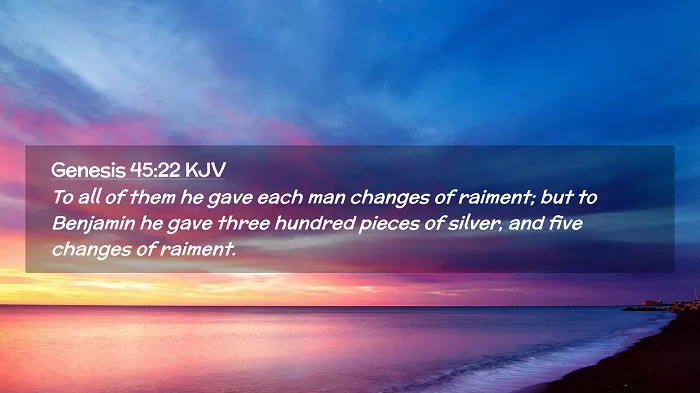Read the Daily Bible Verse – Genesis 45:22 To Strengthen Your Spiritual Journey.
Genesis 45:22 reads in the King James Version (KJV):
“To all of them he gave each man changes of raiment; but to Benjamin he gave three hundred pieces of silver, and five changes of raiment.”
This verse captures a pivotal moment in the story of Joseph, his reconciliation with his brothers, and the themes of forgiveness, provision, and familial restoration. This article delves deep into the meaning and significance of Genesis 45:22, exploring its historical and spiritual context, its implications for believers, and its modern-day relevance.
Genesis 45:22 is a verse that reflects both generosity and preferential treatment, encapsulating the richness of Joseph’s forgiveness and love toward his brothers after years of separation and betrayal. This verse might seem simple, describing Joseph’s gifts to his brothers, but it holds profound meaning within the larger narrative of Genesis and offers lessons that resonate across time.
The Context on Genesis 45:22 KJV
Genesis 45 recounts the climax of Joseph’s story. Joseph, once sold into slavery by his jealous brothers, has risen to power as the governor of Egypt. A severe famine forces his brothers to travel to Egypt in search of food, unknowingly coming face-to-face with the brother they wronged years earlier.
By the time we reach Genesis 45:22, Joseph has revealed his identity to his brothers and extended forgiveness. He instructs them to bring their father, Jacob, and their households to Egypt, where they will be provided for during the famine. As a gesture of goodwill, Joseph gives each brother clothing and lavishes Benjamin, his full brother, with additional gifts.
The Genesis 45:22 Meaning
1. Joseph’s Generosity and Forgiveness
The “changes of raiment” Joseph gives to his brothers symbolize a renewal of relationship and standing. Clothing in ancient times often represented identity and status. By providing garments, Joseph not only meets a practical need but also extends honor and dignity, effectively restoring his brothers despite their past actions.
Benjamin’s additional gifts of “three hundred pieces of silver and five changes of raiment” highlight Joseph’s special affection for his full brother. This preferential treatment recalls the earlier favoritism Jacob showed Joseph and Benjamin, but now it carries a tone of reconciliation rather than rivalry.
2. Restitution and Restoration
The gifts signal a reversal of past wrongs. Joseph’s brothers once stripped him of his special coat and sold him for silver. Now, Joseph clothes them and provides silver as a gesture of grace. This act demonstrates how God can redeem and restore even the most fractured relationships.
3. A Reflection of God’s Provision
Joseph’s actions mirror God’s character—providing abundantly for those in need, regardless of their failures. This verse foreshadows the ultimate provision of Christ, who clothes believers in righteousness and restores them to fellowship with God.
Genesis 45:22 Application in Life
Genesis 45:22 teaches timeless lessons about forgiveness, generosity, and relational healing.
1. Practicing Forgiveness
Joseph’s ability to forgive his brothers after such deep betrayal is a model for Christians. His forgiveness wasn’t superficial; it was accompanied by tangible acts of kindness. Believers are called to forgive as Christ forgives, extending grace even to those who wrong us.
2. The Power of Generosity
Joseph’s gifts remind us that generosity can break down barriers and foster reconciliation. In our lives, acts of giving—whether material or emotional—can rebuild trust and strengthen relationships.
3. Restoring Broken Relationships
Joseph didn’t allow past grievances to define his future with his brothers. This teaches us to prioritize restoration over revenge and to trust God to bring healing to broken families and friendships.
Comparison with Other Biblical Texts
Genesis 45:22 resonates with similar themes found elsewhere in Scripture:
1. The Prodigal Son (Luke 15:11-32)
Like Joseph’s actions, the father in Jesus’ parable welcomes his wayward son with a robe and gifts. Both stories emphasize restoration, honor, and the joy of reconciliation.
2. Esau’s Reconciliation with Jacob (Genesis 33)
Esau’s generous reception of Jacob mirrors Joseph’s forgiveness of his brothers. These narratives highlight the power of forgiveness to mend relationships.
3. Christ’s Teachings on Forgiveness (Matthew 6:14-15)
Jesus’ command to forgive others aligns with Joseph’s example. Both demonstrate that forgiveness is a cornerstone of God’s kingdom.
Modern-Day Relevance
The themes of Genesis 45:22 remain relevant for Christians today.
1. Family Dynamics
Joseph’s story is a reminder that God can heal even the most broken family relationships. Modern families facing estrangement or conflict can find hope in Joseph’s example of forgiveness and reconciliation.
2. Dealing with Past Wounds
Many believers struggle with past hurts and betrayal. Joseph’s ability to forgive and bless his brothers demonstrates how faith in God’s sovereignty can enable us to let go of bitterness.
3. Reflecting Christ’s Love
Joseph’s actions foreshadow Christ’s sacrificial love. By clothing his brothers and providing for them, Joseph points to Jesus, who offers spiritual clothing and provision to all who come to Him.
See Also: Genesis 45:21 Meaning, Context & Commentary
Conclusion
Genesis 45:22 is a verse rich with meaning, illustrating themes of forgiveness, restoration, and divine provision. Joseph’s actions not only restored his family but also foreshadowed the ultimate reconciliation brought by Jesus Christ.
For modern believers, this verse serves as a powerful reminder to forgive generously, seek reconciliation, and trust in God’s redemptive power. Just as Joseph’s story ended in restoration and blessing, so too can our lives reflect God’s grace when we follow His example.
Genesis 45:22 Commentary
Biblical scholars emphasize the significance of Joseph’s gifts as acts of grace and restoration:
1. Matthew Henry’s Commentary
Henry notes that Joseph’s gifts symbolize a transition from enmity to fellowship, reflecting God’s ability to transform relationships.
2. John Gill’s Exposition
Gill highlights the cultural significance of the garments and silver, pointing to their role in ancient practices of reconciliation.
3. Charles Spurgeon
Spurgeon likens Joseph’s actions to the gospel, where believers, once enemies of God, are reconciled and clothed in Christ’s righteousness.
Related topics:


